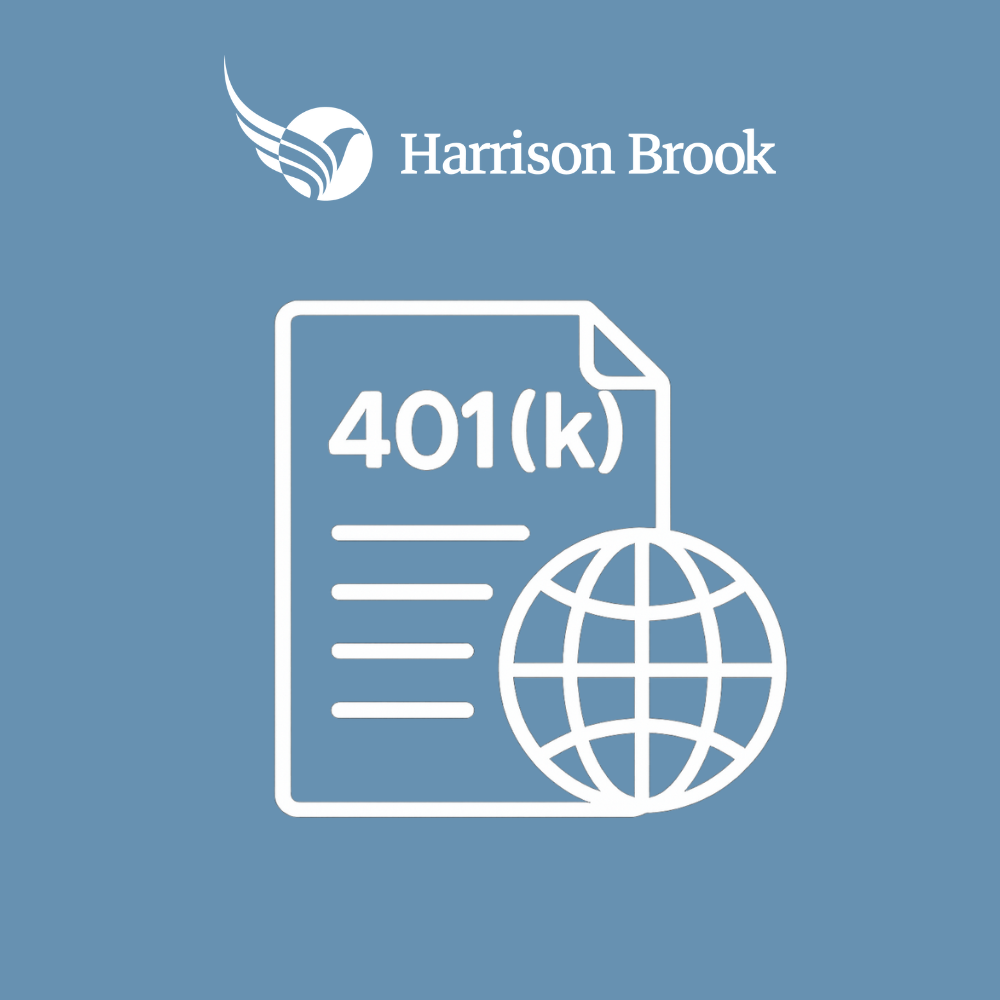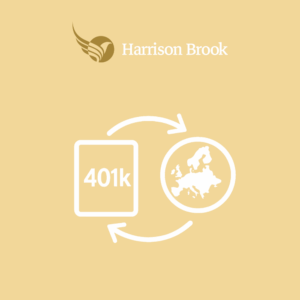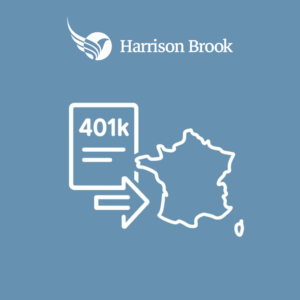
Leaving the United States does not mean leaving your retirement savings behind. Many Americans who have relocated abroad or foreign nationals who once worked in the US still hold a 401(k), and these individuals may still have to pay taxes on their retirement accounts. Understanding what to do with that account once you become a non-US resident is crucial to protecting your wealth and avoiding unnecessary taxes.
Whether you are wondering how to keep your 401(k), roll it into an IRA, or withdraw funds while living overseas, expat retirement planning is essential for both Americans and foreign nationals with US retirement accounts. The right strategy can make a meaningful difference to your long-term financial outcome.
Introduction to 401(k) Plans
A 401(k) plan is a popular employer-sponsored retirement plan in the United States, designed to help employees build retirement savings efficiently. With a 401(k), you can contribute a portion of your salary directly into a tax-advantaged investment account. These contributions are made before income tax is applied, which means your taxable income for the year is reduced. Over time, the money in your 401(k) plan can grow tax deferred, allowing investment returns to compound without being diminished by annual income tax. Many employers also offer matching contributions, further boosting your retirement plan’s value. When you eventually withdraw money from your 401(k), you will pay income tax on those distributions, but the ability to grow tax deferred can make a significant difference in your long-term retirement savings.
What Happens to Your 401(k) When You Leave the US?
If you move abroad, your 401(k) does not automatically close. You can usually keep it where it is, but if you relocate to a foreign country, you may face additional challenges accessing, managing, or making investment changes to your account from overseas.
Most US retirement plan providers require a US address for communication and compliance reasons. Some may also restrict online access, distributions, or investment adjustments for foreign residents. Your current country of residence and your residency status can impact your ability to access or manage your 401(k), as well as affect tax withholding and reporting requirements.
That is why many expats and former US workers choose a 401(k) rollover into an Individual Retirement Account (IRA), or explore international investment structures that align with their new tax residency.
Can a Non-US Resident Keep a 401(k)?
Yes, but with limitations. Non US citizens may also keep their 401(k) if it remains with a US employer or plan custodian. If your 401(k), as a qualified retirement plan, remains with a US employer or plan custodian, you can often leave your funds invested. However, the plan may no longer accept contributions once you are no longer on payroll, and any withdrawals could trigger US withholding taxes of up to 30%, depending on your residency and local tax treaty.
Additionally, currency risk can become a concern for long-term expats who earn and spend in another currency but maintain assets in USD.
Why Consider a 401(k) Rollover?
Rolling over your 401(k) into an IRA can offer several benefits for non-US residents. An IRA rollover is a common method for transferring funds from a 401(k) to a qualified retirement account, helping to manage retirement savings in a tax-efficient way.
- More investment choice: IRAs generally offer broader investment options than employer 401(k)s.
- Better control: You can manage your account independently without relying on your former employer.
- Potentially lower fees: Depending on your provider, administrative costs may decrease after rollover.
- Simplified tax reporting: A rollover to an IRA can be done tax-free if handled correctly.
- Preserve tax advantages: Transferring funds to a qualified retirement account can help maintain important tax benefits.
However, a standard US-based IRA can still pose issues if you are living abroad — especially for non-US tax residents or those without a valid US address.
Options for Americans Living Abroad
If you are a US citizen living abroad, you remain subject to US tax on worldwide income, including any withdrawals from a 401(k) or IRA. Retirement plan distributions may be taxed by both the US and the foreign country. You can roll your 401(k) into a US IRA, but ensure your new provider will work with international clients. Some Americans may consider a foreign retirement plan as an alternative to a US-based IRA, depending on their country of residence. Many large custodians, including Vanguard and Fidelity, have restrictions for non-US residents.
Some expats choose to work with cross-border financial advisers who specialize in US-compliant investment solutions that remain accessible overseas. These advisers offer expat retirement planning services and can help with both US and foreign retirement plans, ensuring structures are compatible with FATCA, PFIC rules, and local tax laws.
Options for Foreign Nationals Who Worked in the US
If you are a foreign national, green card holder, or permanent resident who no longer resides in the United States but previously earned income in the US, your 401(k) balance is still yours, but withdrawing it can lead to complex tax consequences.
Eligibility for employer sponsored retirement plans like a 401(k) is based on earning income while working in the US. As an employer sponsored retirement plan, the 401(k) remains subject to specific tax rules for foreign nationals, permanent residents, and green card holders after you leave the country.
Typically, the IRS requires a 30% withholding tax on distributions to non-residents. Depending on your country of residence, a US-tax treaty may reduce this rate. For example, some treaties allow a 15% or even 0% rate on certain pension distributions.
You may also roll over your 401(k) into an IRA to maintain tax-deferred growth until retirement, but finding a custodian willing to hold the account for a non-resident can be challenging. This is where Harrison Brook USA can assist.
Roth IRA Considerations
A Roth IRA is a unique type of individual retirement account that offers tax-free growth and tax-free withdrawals in retirement. Unlike traditional IRAs, where contributions are made with pre-tax dollars and taxed upon withdrawal, Roth IRAs are funded with after-tax income. This means you pay income tax on your contributions up front, but your investments grow tax deferred and qualified withdrawals are completely tax free. Deciding between a Roth IRA and a traditional IRA often comes down to your current and expected future tax bracket. If you anticipate being in a higher tax bracket during retirement, a Roth IRA can be especially advantageous, as you lock in today’s tax rate and avoid paying higher taxes on your retirement account withdrawals later. However, Roth IRAs have income limits, and eligibility to contribute phases out at higher income levels. Understanding these rules is essential for effective retirement planning and maximizing the benefits of your individual retirement account.
The 401(k) Rollover Process
A 401(k) rollover typically involves moving your retirement funds directly from your employer’s plan to an IRA.
- Contact your plan provider and confirm eligibility for a rollover.
- Select your receiving institution — ideally one familiar with international clients.
- Request a direct rollover (trustee-to-trustee transfer) to avoid tax withholding.
- Invest your funds according to your new goals and residency considerations.
Remember that if you withdraw funds instead of transferring them directly, the IRS may withhold 20% automatically, and you could owe additional penalties if you are under 59½. The plan provider or financial institution may act as a withholding agent for tax purposes. Failing to complete a direct rollover could result in immediate tax liabilities, especially if you take a lump sum distribution. The tax consequences of a lump sum withdrawal can also vary depending on the tax year in which the distribution occurs.
IRA Distributions
Taking money out of an individual retirement account—known as an IRA distribution—comes with important tax implications that vary depending on the type of retirement account you hold. For traditional IRAs, distributions are generally taxed as ordinary income, and you must begin taking required minimum distributions (RMDs) starting at age 73. Failing to take RMDs can result in steep penalties. In contrast, Roth IRAs offer tax free withdrawals if certain conditions are met, and they do not require RMDs during the account holder’s lifetime, allowing your investments to grow tax deferred for as long as you wish. Understanding the rules around IRA distributions is crucial to avoid unnecessary taxes or penalties and to make the most of your retirement savings. Always consider the tax implications before making withdrawals from your traditional IRA, Roth IRA, or other retirement accounts.
The “Rollover Loophole” Explained
The so-called “401(k) rollover loophole” refers to the ability to move funds into an IRA without immediate taxation, provided you follow IRS rollover rules. The key is ensuring a direct transfer between institutions rather than receiving a check personally.
You generally have 60 days to complete a rollover once funds leave the 401(k). If you miss that window, the withdrawal may become taxable and penalized. Non-residents must take special care to ensure cross-border transfers comply with both IRS and foreign jurisdiction rules. You must report rollovers and distributions on your tax return or federal income tax return, and different tax rates and tax treatment may apply depending on your residency status, which can affect your overall tax burden.
401(k) Tax Implications for Non-US Residents
US retirement accounts are subject to IRS rules regardless of where you live. The Internal Revenue Service requires reporting of retirement plan distributions and payment of income taxes, whether you are a resident or nonresident alien. However, your local tax authority may also consider your 401(k) or IRA when calculating taxable income.
This can result in double taxation unless an income tax treaty prevents it. Your tax liabilities may differ based on income tax treaties between the US and your country of residence. Many countries have specific provisions for US retirement accounts, but not all. For example, France, the UK, and Canada each have their own interpretations of when US pensions become taxable locally. Federal income tax may apply to early withdrawals from your IRA account or 401(k), and penalty free early withdrawal or penalty free withdrawals are only allowed under specific circumstances, such as reaching retirement age.
Working with a bilingual, cross-border tax specialist ensures correct reporting and maximizes treaty benefits.
Early Withdrawal Penalties
Withdrawing money from a retirement account such as a 401(k) or IRA before reaching age 59½ can trigger early withdrawal penalties and additional income tax. The IRS generally imposes a 10% early withdrawal penalty on the amount withdrawn, on top of regular income tax owed. These rules are designed to encourage individuals to preserve their retirement savings for their intended purpose. However, there are exceptions to the early withdrawal penalty, such as using funds for a first-time home purchase, qualified education expenses, or in cases of permanent disability. Understanding the early withdrawal rules and potential penalties is vital to avoid unnecessary tax burdens and to protect your retirement accounts. Consulting a financial advisor or tax professional can help you navigate these regulations and make informed decisions about when and how to withdraw money from your retirement savings.
FAQs – 401k Rollover For Non US Residents
Can a non-US citizen contribute to a 401(k)? Yes, if you work for a US employer and meet eligibility rules, you can contribute to a qualified retirement plan such as a 401(k). Once you leave that job or the country, contributions generally stop.
Can I keep my 401(k) if I move abroad? Yes, but management may become more difficult. You might not be able to change investments or withdraw easily without US tax consequences.
Can I roll my 401(k) into an IRA from overseas? Yes, but ensure your new custodian accepts non-resident clients. You can roll your 401(k) into a qualified retirement account, such as an IRA account. A direct rollover avoids withholding taxes. Be aware of the tax rates that may apply to your rollover and the potential tax burden, which can vary based on your residency status and tax treaties.
What happens if I cash out my 401(k) as a non-resident? The IRS may withhold up to 30% in taxes, and you might owe more depending on your local tax laws. You must report the distribution on your tax return for the relevant tax year. A withholding agent may be involved in processing the withdrawal and ensuring the correct amount is withheld.
Can I open an international retirement account? Yes. Many expats use global investment accounts structured for tax efficiency in both the US and their current country of residence. Your current country may have different rules regarding retirement accounts, so consulting financial advisors is recommended to ensure compliance and optimal tax planning.
Working with Cross-Border Financial Specialists
At Harrison Brook USA, we work with a global network of financial advisors, tax professionals, and legal specialists who understand both US and international pension systems. Our financial advisors can help you understand the tax treatment and potential tax liabilities associated with cross-border retirement accounts.
If you are living overseas with a 401(k), IRA, or other US investment, our advisers can help you:
- Review rollover options and international investment access
- Ensure compliance with IRS and FATCA requirements
- Coordinate with local tax advisers for treaty optimization, tax treatment, and managing tax liabilities
Our mission is to simplify complex cross-border wealth management — helping Americans abroad protect and grow their retirement savings confidently.
Get Expert Advice on 401k
Speak with a Harrison Brook USA adviser today to discuss your 401(k) rollover options as a non-US resident. We provide transparent, fee-based advice tailored to US expats and global professionals.
Contact us now to schedule your free consultation.



